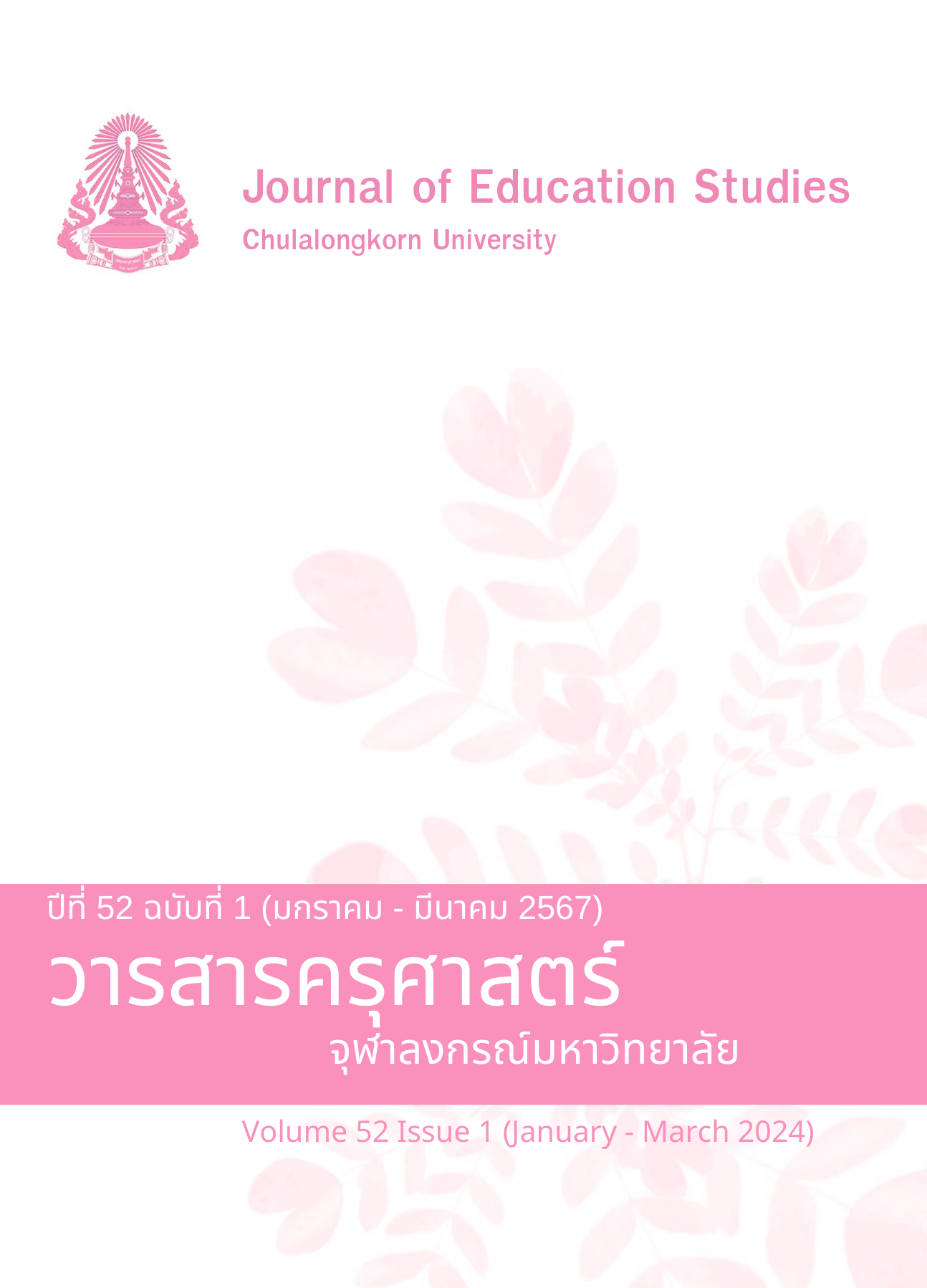การศึกษารูปแบบการประเมินออนไลน์สำหรับทักษะการทำวิจัยของผู้เรียนระดับอุดมศึกษา คณะศึกษาศาสตร์ มหาวิทยาลัยรามคำแหง
DOI:
https://doi.org/10.14456/educu.2024.6คำสำคัญ:
รูปแบบการประเมินออนไลน์, ทักษะการทำวิจัย, ผู้เรียนระดับอุดมศึกษาบทคัดย่อ
ทักษะการทำการวิจัย เป็นทักษะที่จำเป็นสำหรับผู้เรียนในระดับอุดมศึกษา และเป็นกระบวนการที่ช่วยสร้างสรรค์และพัฒนาองค์ความรู้หรือนวัตกรรมใหม่ๆ แต่เนื่องจากปัจจุบันการจัดการเรียนการสอนในระดับอุดมศึกษาได้ปรับเปลี่ยนตามสถานการณ์การใช้ชีวิตวิถีใหม่ทำให้ต้องมีการปรับวิธีการสอน ตลอดจนการวัดและประเมินผลเป็นรูปแบบออนไลน์เพิ่มมากขึ้น การวิจัยครั้งนี้จึงมีวัตถุประสงค์เพื่อ 1) ศึกษาสภาพการทำวิจัยของผู้เรียนระดับอุดมศึกษา 2) ศึกษารูปแบบ
การประเมินออนไลน์ทักษะการทำวิจัยของผู้เรียนระดับอุดมศึกษา และ 3) ศึกษาความเหมาะสมและความเป็นไปได้ของรูปแบบการประเมินออนไลน์ทักษะการทำวิจัยของผู้เรียนระดับอุดมศึกษา คณะศึกษาศาสตร์ มหาวิทยาลัยรามคำแหง กลุ่มเป้าหมายของการวิจัยครั้งนี้คือ นักศึกษาระดับปริญญาตรี จำนวน 576 คน และปริญญาโทจำนวน 10 คน รวมทั้งหมด 586 คน ที่เรียนในรายวิชาด้านการวิจัย โดยมีเครื่องมือวิจัยได้แก่ แบบสอบถามเกี่ยวกับสภาพการทำวิจัย แบบสัมภาษณ์
แบบประเมินการใช้งาน e-assessment และแบบประเมินความเป็นไปได้และความเหมาะสมของรูปแบบการประเมินออนไลน์ทักษะการทำวิจัย
ผลการวิจัยพบว่า 1) ระดับสภาพการทำวิจัยของผู้เรียนระดับอุดมศึกษาพบว่า ผู้เรียนส่วนใหญ่มีระดับสภาพการทำวิจัยอยู่ในระดับมาก ค่าเฉลี่ยอยู่ระหว่าง 3.97-4.52 2) รูปแบบการประเมินออนไลน์ที่นำมาใช้ในการจัดการเรียนการสอนและการทำวิจัย ประกอบด้วยแพลตฟอร์ม Edpuzzle Mentimeter และ Classkick ผลการประเมินการใช้จากผู้เรียนทั้งหมด 20 คน พบว่า คะแนนภาพรวมส่วนใหญ่อยู่ในระดับดีมาก 3) การพิจารณาความเป็นไปได้และความเหมาะสมของรูปแบบการประเมินออนไลน์ทักษะการทำวิจัย พบว่า ด้านความเหมาะสม คือ สามารถใช้งานได้หลายคนและสามารถทำงานร่วมกันเป็นกลุ่มหรือเป็นทีมได้ และเมื่อพิจารณาในมิติด้านความเป็นไปได้ คือ สามารถใช้งานได้หลายคนและสามารถทำงานร่วมกันเป็นกลุ่มหรือเป็นทีม และสามารถให้ข้อมูลป้อนกลับได้ตลอดเวลาและทำได้อย่างต่อเนื่อง ผลการวิจัยครั้งนี้ช่วยเป็นสารสนเทศสำหรับการพัฒนาทักษะการทำการวิจัยของผู้เรียน ทั้งยังเป็นแนวทางหรือทางเลือกในการประเมินออนไลน์ความรู้ ทักษะการทำวิจัย หรือทักษะด้านอื่น ๆ ของผู้เรียนในหลักสูตรต่อไป
เอกสารอ้างอิง
ภาษาไทย
ณัฏฐภรณ์ หลาวทอง. (2563, 20 พฤศจิกายน). แนวทาง “การวัดและประเมินผลการเรียน” ผ่านระบบ Online ในสถานการณ์วิกฤติ COVID-19. https://www.facebook.com/ LicChula/photos/a.2854939044587216/2854939391253848/?type=3&theater&ifg=1.
ไพศาล สุวรรณน้อย. (2563, 20 พฤศจิกายน). Instructional Design for Online Learning. https://edu.rmu.ac.th/n2019/index.php/service-site/subj/doc-seminar/ transitioning-to-the-new-normal-education/84-2020-06-10-08-20-11-1/file.
ภาษาอังกฤษ
Al-Azawei, A., Baiee, W.R., & Mohammed, M.A. (2019). Learner’s experience toward e-Assessment Tools: A comparative study on Virtual Reality and Moodule Quiz. iJET, 14(5), 34-50. https://onlinejour.journals.publicknowledgeproject.org/index.php/i-jet/article/viewFile/9998/5576
Alruwais, N., Wills, G., & Wald, M. (2018). Advantages and challenges of using e-Assessment. Inernational Journal of Information and Technology, 8(1), 34-37.
Berdie, D.R., Anderson J.F., & Niebuhr MA. (1986). Questionnaires: design and use. Metuchen, N.J.: Scarecrow Press
Joshi, A., Virk, A., Saiyad, Sh., Mahajan, R. & Singh, T. (2020). Online Assessment: Concept and Applications. Journal of Research in Medical Education & Ethics. 10, 49-59. https://doi.org/10.5958/2231-6728.2020.00015.3.
Mostert, M., & Snowball, J.D. (2013). Where angels fear to tread: online peer-assessment in a large first -year class. Assessment and Evaluation in Higher Education, 38(6), 674-686. https://doi.org/10.1080/02602938.2012.683770
Page, L., & Cherry, M. (2018). Comparting trends in graduate assessment: face-to-face vs. online learning. Assessment Update, 30(5), 3-15. https://doi.org/10.1002/au.30144
Ridgway, J., McCusker, S., & Pead, D., (2004). Literature review of e-assessment, Bristol. https://www.researchgate.net/publication/30050842_Literature_review_of_e-assessment.
Sitthisak O., Gilbert, L. & Davis, H. C. (2008). An evaluation of pedagogically informed parameterised questions for self‐assessment. Learn Media Technol, 33(3), 235–248. https://doi.org/10.1080/17439880802324210
Thompson, M. M., & Braude, E. J. (2016). Evaluation of Knowla: An online assessment and learning tool. Journal of Educational Computing Research, 54(4), 483– 512. https://doi.org/10.1177/0735633115621923
Usher, M., & Barak, M. (2018). Peer assessment in a project-based engineering course: comparing between on-campus and online learning environments. Assessment and Evaluation in Higher Education, 43(5), 745-759. https://doi.org/10.1080/02602938.2017.1405238
van de Heyde, V., & Siebrits, A. (2019). Higher-Order e-Assessment for Physics in the Digital Age Using Sakai. The Physics Teacher, 57(1), 32-34. https://doi.org/10.1119/1.5084925
Van der Linden, W., Bakx, A., Ros, A., Beijaard, D., & Vermeulen, M. (2012). Student teachers’ development of a positive attitude towards research and research knowledge and skills. European Journal of Teacher Education, 35(4), 401-419. https://doi.org/10.1080/02619768.2011.643401
Weleschuk , A., Dyjur, P., & Kelly, P. (2019). Online Assessment in Higher Education. Taylor Institute for Teaching and Learning Guide Series. Calgary, AB: Taylor Institute for Teaching and Learning at the University of Calgary. https://taylorinstitute.ucalgary.ca/resources/guides
Yin, Z., Lesser, J., Paiva, K.A., Zapata, J.J., Moreno-Vasquez, A., Grigsby, T.J., Ryan-Pettes, S.R., Parra-Medina, D., Estrada, V., Li, Sh., & Wang, J. (2020). Using Mobile Health Tools to Engage Rural Underserved Individuals in a Diabetes Education Program in South Texas: Feasibility Study. JMIR Mhealth Uhealt, 8(3). https://mhealth.jmir.org/2020/3/e16683/pdf
ดาวน์โหลด
เผยแพร่แล้ว
รูปแบบการอ้างอิง
ฉบับ
ประเภทบทความ
สัญญาอนุญาต

อนุญาตภายใต้เงื่อนไข Creative Commons Attribution-NonCommercial-NoDerivatives 4.0 International License.




